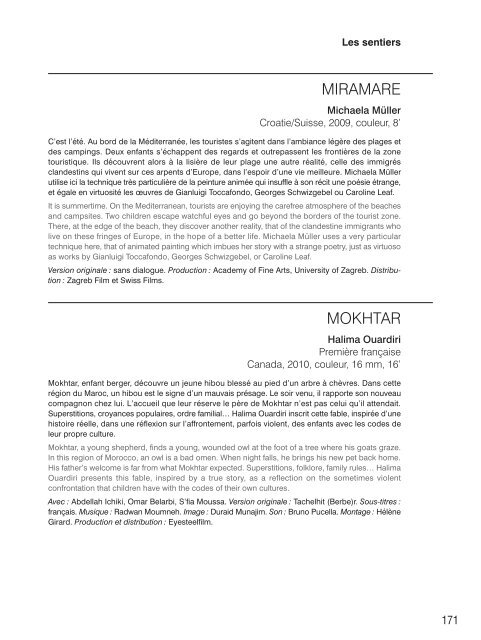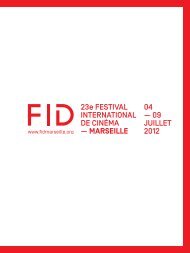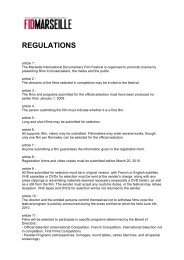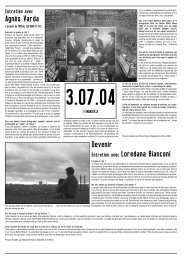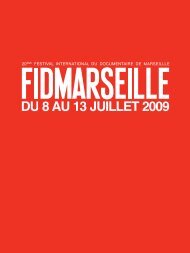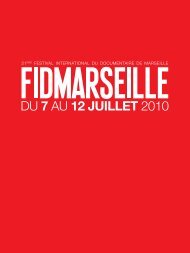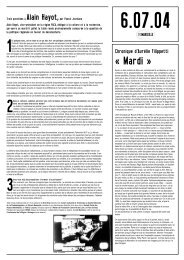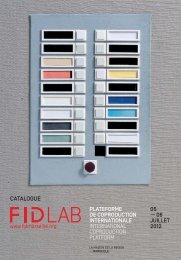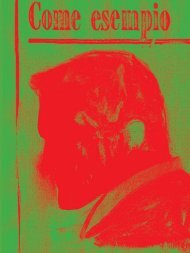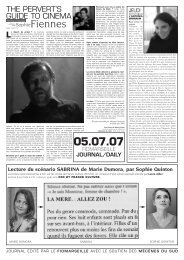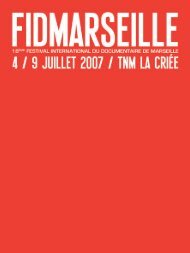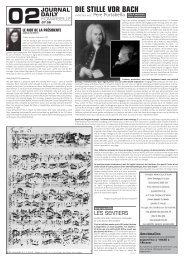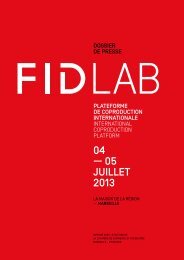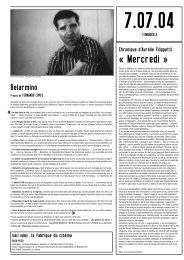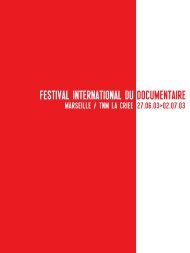FID Marseille 2011 - Festival international du documentaire de ...
FID Marseille 2011 - Festival international du documentaire de ...
FID Marseille 2011 - Festival international du documentaire de ...
Create successful ePaper yourself
Turn your PDF publications into a flip-book with our unique Google optimized e-Paper software.
Les sentiersMIRAMAREMichaela MüllerCroatie/Suisse, 2009, couleur, 8’C’est l’été. Au bord <strong>de</strong> la Méditerranée, les touristes s’agitent dans l’ambiance légère <strong>de</strong>s plages et<strong>de</strong>s campings. Deux enfants s’échappent <strong>de</strong>s regards et outrepassent les frontières <strong>de</strong> la zonetouristique. Ils découvrent alors à la lisière <strong>de</strong> leur plage une autre réalité, celle <strong>de</strong>s immigrésclan<strong>de</strong>stins qui vivent sur ces arpents d’Europe, dans l’espoir d’une vie meilleure. Michaela Müllerutilise ici la technique très particulière <strong>de</strong> la peinture animée qui insuffle à son récit une poésie étrange,et égale en virtuosité les œuvres <strong>de</strong> Gianluigi Toccafondo, Georges Schwizgebel ou Caroline Leaf.It is summertime. On the Mediterranean, tourists are enjoying the carefree atmosphere of the beachesand campsites. Two children escape watchful eyes and go beyond the bor<strong>de</strong>rs of the tourist zone.There, at the edge of the beach, they discover another reality, that of the clan<strong>de</strong>stine immigrants wholive on these fringes of Europe, in the hope of a better life. Michaela Müller uses a very particulartechnique here, that of animated painting which imbues her story with a strange poetry, just as virtuosoas works by Gianluigi Toccafondo, Georges Schwizgebel, or Caroline Leaf.Version originale : sans dialogue. Pro<strong>du</strong>ction : Aca<strong>de</strong>my of Fine Arts, University of Zagreb. Distribution: Zagreb Film et Swiss Films.MOKHTARHalima OuardiriPremière françaiseCanada, 2010, couleur, 16 mm, 16’Mokhtar, enfant berger, découvre un jeune hibou blessé au pied d’un arbre à chèvres. Dans cetterégion <strong>du</strong> Maroc, un hibou est le signe d’un mauvais présage. Le soir venu, il rapporte son nouveaucompagnon chez lui. L’accueil que leur réserve le père <strong>de</strong> Mokhtar n’est pas celui qu’il attendait.Superstitions, croyances populaires, ordre familial… Halima Ouardiri inscrit cette fable, inspirée d’unehistoire réelle, dans une réflexion sur l’affrontement, parfois violent, <strong>de</strong>s enfants avec les co<strong>de</strong>s <strong>de</strong>leur propre culture.Mokhtar, a young shepherd, finds a young, woun<strong>de</strong>d owl at the foot of a tree where his goats graze.In this region of Morocco, an owl is a bad omen. When night falls, he brings his new pet back home.His father’s welcome is far from what Mokhtar expected. Superstitions, folklore, family rules… HalimaOuardiri presents this fable, inspired by a true story, as a reflection on the sometimes violentconfrontation that children have with the co<strong>de</strong>s of their own cultures.Avec : Ab<strong>de</strong>llah Ichiki, Omar Belarbi, S’fia Moussa. Version originale : Tachelhit (Berbe)r. Sous-titres :français. Musique : Radwan Moumneh. Image : Duraid Munajim. Son : Bruno Pucella. Montage : HélèneGirard. Pro<strong>du</strong>ction et distribution : Eyesteelfilm.171


